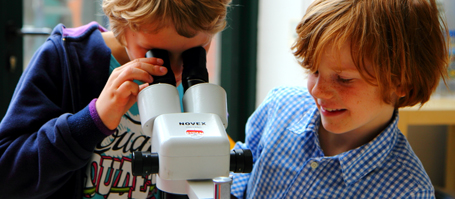Marvel, experiment, try out – learning is fun in the Kieler Forschungswerkstatt!
Appropriate to their respective level of study, students get fascinating insights into marine sciences and the working methods of real scientists in the Forschungswerkstatt. Our offers address entire school classes. Depending on the class size, students are split into small groups. Moreover, the programs of the Forschungswerkstatt complement the natural science curricula of schools and are a worthwhile addition to lessons at school.
Marine Science programs in the Forschungswerkstatt
1.1 The Baltic Sea as a natural habitat
The Baltic Sea is a unique natural habitat. Changing abiotic factors, e.g. salt concentration, require high adaptability of the indigenous plant and animal species. The research focus of this program lies on the living creatures of the Baltic Sea which live in a complex relationship to each other. Starting with plankton, student groups examine the different levels of the food web and their relationship to each other. Human intervention in the ecosystem “Baltic Sea” and its consequences are also highlighted in this section.
- Why does Baltic Sea water vary in its salt concentration? What kind of relationship is there between the blue mussel and the common starfish?
- What is plankton and why is it so important?
- How does plastic waste find its way into the ocean?
- Noise pollution under water – a problem for harbor porpoises?
Different thematic modules can be chosen and individual focuses can be set.
Suitable for grades 3 to 6, duration: 4 hours
admission form
1.2 “The Ocean” as an ecosystem and how it is affected by anthropogenic impacts
The ocean is a very complex and exciting ecosystem and habitat. 95 percent of the sea floor have not been or have barely been explored yet and regularly present new research questions to marine scientists. Moreover, economic utilization of marine resources is becoming increasingly important, but at the same time it endangers this sensitive habitat. The program offers an integrated investigation of the ecosystem “ocean” with a focus not only on biological aspects. The interdisciplinary program focuses on both biotic and abiotic factors of the habitat. Building on professional fundamentals, hazards for this habitat are explored thoroughly. Afterwards, reasons as well as ideas for improvements are discussed. In addition to pollution of the ocean through plastic waste and noise, the effects of climate change and eutrophication will play a role in discussions and tasks.
Suitable for grades 7 to 10, duration: 4 hours
admission form
1.3 Will we still be able to eat fish tomorrow? – Overfishing of the Ocean
The ecosystem “ocean” is a complex habitat rich in species. Fish and other organisms (such as crabs) utilized in the fishing industry are an important part of food webs. For thousands of years humans have been closely linked to the resource “fish” and worldwide there are millions of people depending on catching wild fish or fish farming. Thus, there are consequences we have to face: One quarter of marine fish stocks worldwide are rated as overfished, 50 percent are utilized at the limit of their capacity. Several fish stocks have even collapsed due to the high amounts of fish landed. Researchers worry that many more stocks will be affected soon if fisheries management and politics do not change drastically.
In this program of “overfishing of the ocean” students will become familiar with different catching methods, determine the age of fish by using the otolith method and will deal critically with the topic “sustainable fishery” in a fictitious conference on fisheries.
Suitable for grades 10 to 13, duration: 5 hours
admission form
Further education for teachers in the Ocean Lab
The Kieler Forschungswerkstatt does not offer courses exclusively for students, but also gives new incentives and impulses to teachers for their daily teaching. By taking part in these further education courses, teachers can catch up on recentresearch topics. They gain ideas and tips on how to integrate those research topics into their teaching and the regular topics in the curriculum.
admission form
Contact
Kiel Science Factory
info@forschungs-werkstatt.de
Phone: +49 (0)431 880-5916
…
